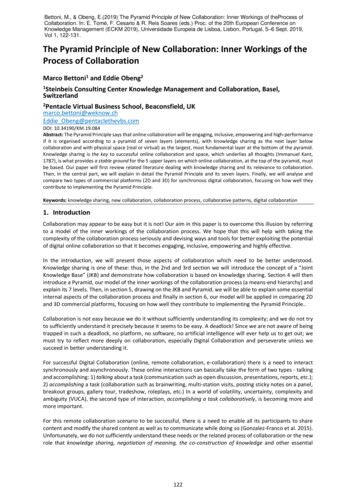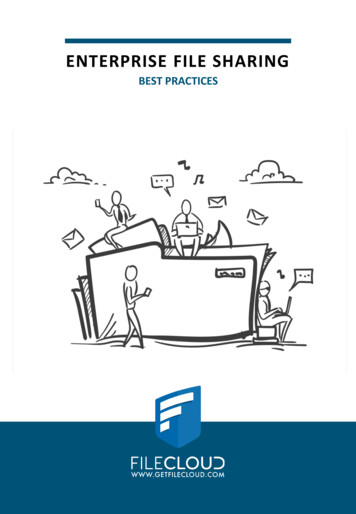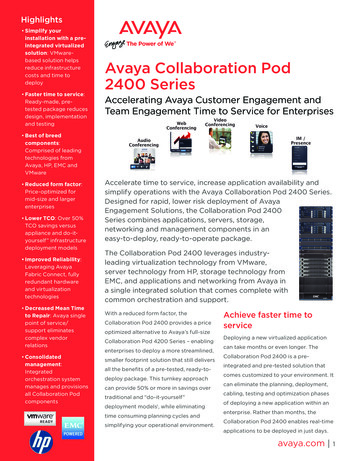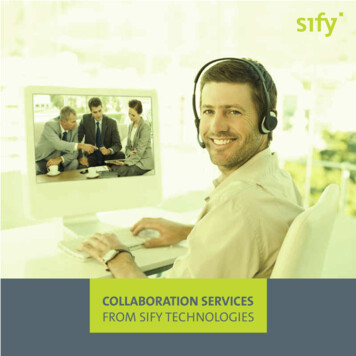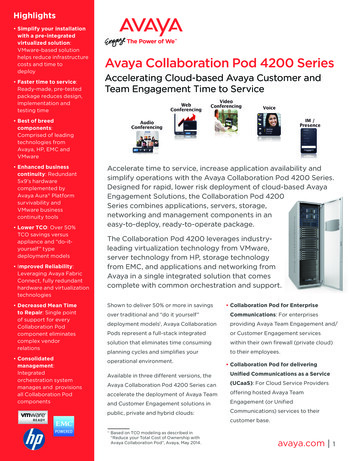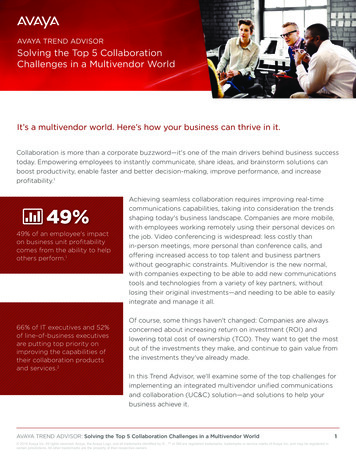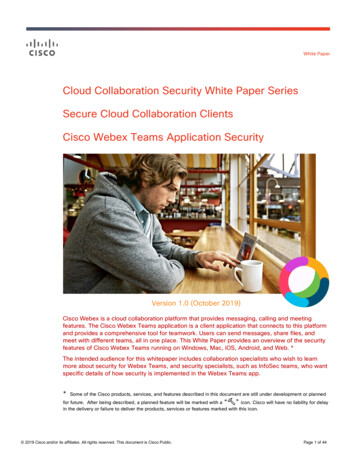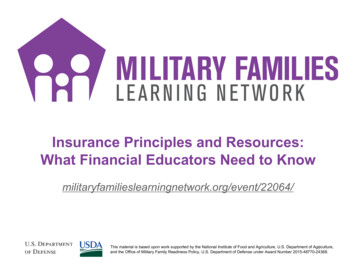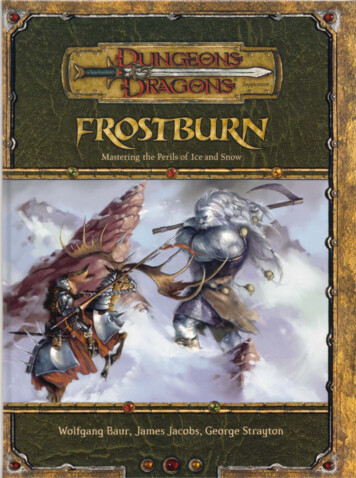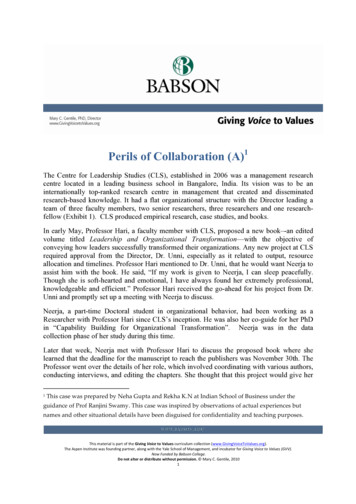
Transcription
Perils of Collaboration (A)1The Centre for Leadership Studies (CLS), established in 2006 was a management researchcentre located in a leading business school in Bangalore, India. Its vision was to be aninternationally top-ranked research centre in management that created and disseminatedresearch-based knowledge. It had a flat organizational structure with the Director leading ateam of three faculty members, two senior researchers, three researchers and one researchfellow (Exhibit 1). CLS produced empirical research, case studies, and books.In early May, Professor Hari, a faculty member with CLS, proposed a new book–-an editedvolume titled Leadership and Organizational Transformation—with the objective ofconveying how leaders successfully transformed their organizations. Any new project at CLSrequired approval from the Director, Dr. Unni, especially as it related to output, resourceallocation and timelines. Professor Hari mentioned to Dr. Unni, that he would want Neerja toassist him with the book. He said, “If my work is given to Neerja, I can sleep peacefully.Though she is soft-hearted and emotional, I have always found her extremely professional,knowledgeable and efficient.” Professor Hari received the go-ahead for his project from Dr.Unni and promptly set up a meeting with Neerja to discuss.Neerja, a part-time Doctoral student in organizational behavior, had been working as aResearcher with Professor Hari since CLS’s inception. He was also her co-guide for her PhDin “Capability Building for Organizational Transformation”. Neerja was in the datacollection phase of her study during this time.Later that week, Neerja met with Professor Hari to discuss the proposed book where shelearned that the deadline for the manuscript to reach the publishers was November 30th. TheProfessor went over the details of her role, which involved coordinating with various authors,conducting interviews, and editing the chapters. She thought that this project would give herThis case was prepared by Neha Gupta and Rekha K.N at Indian School of Business under the1guidance of Prof Ranjini Swamy. This case was inspired by observations of actual experiences butnames and other situational details have been disguised for confidentiality and teaching rdistributewithoutpermission. MaryC.Gentile,20101
an opportunity to interact with various high level leaders in organizations that had undergonesuccessful transformation. The thought that this project might help in collecting data for herPhD added to her excitement.Neerja started working hard on the book. She interviewed eight leaders and submitted thewrite-up to Professor Hari at the end of the first week of October and she was anxious for hisfeedback. After a week, Professor Hari called Neerja to give his comments and mentionedthat he was impressed.Little did she know that there was another surprise waiting for her.During the meeting, Professor Hari invited her to author a book chapter on the turnaround ofa leading IT firm: BLM Ltd. She was thrilled as it would help her meet the publicationrequirement for her PhD programme and begin fulfilling her long cherished dream of being apublished author.On October 25th, more than a month before the deadline, she was ready to submit the firstdraft of the BLM Ltd. chapter to Professor Hari.On the same day, during a team meeting, Dr. Unni introduced Rahul as the new Researchfellow at CLS. Rahul, was an aspiring doctoral student with two decades of experience inapplied research in the IT field. Before joining CLS, he was the Associate Director ofResearch at BLM Ltd. In addition, Rahul had earned his B.Tech and M.Tech in ComputerScience from one of the top engineering colleges in India. He was a BLM Ltd. “life-timer”who had also earned three patents in database and network management.During the announcement, Dr. Unni mentioned, “I’m proud to have been associated withRahul in the earlier part of my career. Rahul has been instrumental in the flawless executionof several key projects at BLM Ltd. and was even personally involved in the widelyacclaimed turnaround of the organization.”In his introduction, Rahul shared that he felt privileged to be a part of CLS. He expressedkeen interest in his assignment at CLS related to “commercialization of research.” Hementioned that he aimed to have a few publications before applying for a PhD programmeabroad. All of the faculty members welcomed Rahul and praised Dr. Unni for bringing anexcellent researcher home. One of the faculty members, aware of Rahul’s past achievements,went on to say, “Rahul will serve as a role model for young researchers.”In the meeting, it struck Neerja that Rahul’s experiences at BLM Ltd. would enrich thechapter and she asked Professor Hari for his opinion. He liked the idea. On October 28th,Neerja emailed the first draft of the chapter to Rahul requesting his inputs. Rahul suggestedthat she refer to a book written by the CEO of BLM Ltd. Neerja went through the book andfound the narrative of the initiatives at BLM Ltd. very insightful. She incorporated thosenarratives into the chapter. She shared the revised draft with Professor Hari and informed himof Rahul’s recommendation. Professor Hari said: “Find out if Rahul would like to istributewithoutpermission. MaryC.Gentile,20102
the chapter. With his involvement in the BLM Ltd. turnaround, it would be like listening tothe story from the horse’s mouth.”On November 3rd, Neerja e-mailed Rahul to ascertain his interest in co-authoring the chapter.He happily agreed and asked Neerja to schedule a meeting with Professor Hari.In the meeting held on November 5th, Neerja briefed Professor Hari and her new co-authorRahul on the storyline. Professor Hari then asked Rahul to share his experiences from theturnaround of BLM Ltd. Rahul’s insights into the transformation journey impressed ProfessorHari and Neerja. Professor Hari spelled out his expectations for the chapter which includedadding some of Rahul’s personal experiences and set November 20th as the deadline. Beforeleaving, Rahul thanked Professor Hari for this opportunity as the publication would help himin applying for his PhD. He asked Neerja to send him the draft.Neerja happily emailed the chapter to Rahul as soon as she left the meeting. After three days,Neerja called Rahul to enquire about his progress and he promised to respond by November10th. When she didn’t hear from him, she sent a reminder on November 12th but it was to noavail. Finally, she received Rahul’s version on November 14th.She opened the chapter with excitement, but it quickly fizzled as she read on. There werebarely any changes. The only new element was an overview of BLM Ltd. which was copiedfrom the company website. Everything shared by Rahul so far had begun to seem like a talltale. Moreover, she was surprised to notice that he added “Rahul Kumar” as the secondauthor in the revised draft.On November 15th, Neerja again called Rahul to ask that he add his experiences to thechapter to which Rahul sternly replied, “I’m busy with multiple assignments. Kindly goahead with it.”In order to complete the chapter, she had to collaborate with Rahul, but she didn’t know how.She even scheduled a face-to-face meeting, but he never showed up. Time was running outand the chapter was still in the same state. At this juncture, Neerja mentioned her experiencewith Rahul to Professor Hari. Professor Hari asked her to submit the current draft withoutwaiting for Rahul’s input anymore. He told Neerja that he would go through the chapter andgive feedback the next day.The final verdict by Professor Hari would decide the chapter’s fate: in the book or the bin. Onthe morning of November 19th, Professor Hari praised Neerja for an insightful chapter. Shewas overjoyed to have written her first ever book chapter! But, she was surprised to seeRahul’s name struck off from the top. When she pointed it out, Professor Hari remarked, “It’syour call. I am fine with either including or excluding Rahul’s name.”Neerja decided to discuss the issue with her colleagues.Neerja approached a few researchers and was surprised to receive similar feedback aboutRahul. One colleague mentioned how during a joint project, he had calmly requested istributewithoutpermission. MaryC.Gentile,20103
help on something to which Rahul had screamed in response that he was “not his assistantand would not just do whatever he wanted.” His unwillingness to collaborate had eventuallyled to the shelving of the project.Neerja was in a dilemma. If she excluded Rahul’s name from the chapter, he might cry foul.Neerja had enjoyed a cordial relationship with her peers and superiors; but this incident couldresult in animosity with Rahul and damage the congenial environment at CLS. He could alsospoil her reputation by bad-mouthing her with faculty members who were his lunch partners.Moreover, Rahul himself had added his name as a co-author and was very keen to have hisfirst publication before applying to PhD programs.On the other hand, adding Rahul as co-author would send the wrong signal to the CLS team.They would think that free-riding was acceptable at the centre. Neerja’s decision would set aprecedent at CLS that a low level of dedication and effort was enough to claim authorship inresearch outputs. She also wanted to adhere to CLS’s policy about intellectual property andacademic honesty (See Exhibit 2). Furthermore, giving undue credit for work was against thenorms of academia in general and CLS in particular. Moreover, Neerja was an honestresearcher who had never claimed undue credit.The clock was ticking and Neerja had to make her decision before the November 20thdeadline. Neerja’s heart directed her to exclude Rahul from co-authorship of the chapter. Butit was a matter of balancing between heart and mind. She wanted to act on her values but in away that she could maintain a positive relationship with Rahul and his networks, as well.What can Neerja say, to Rahul and Professor Hari, about the co-authorship? When andhow?Revised: stributewithoutpermission. MaryC.Gentile,20104
esforcitationsandreferences.Non- ing,13(2/3),41- e,MA:HarvardUniversityPress.Chapters:Butcher- iaineducationandtraining(pp.60- asanotherco- .Donotalterordistributewithoutpermission. MaryC.Gentile,20105
g).! The!As

